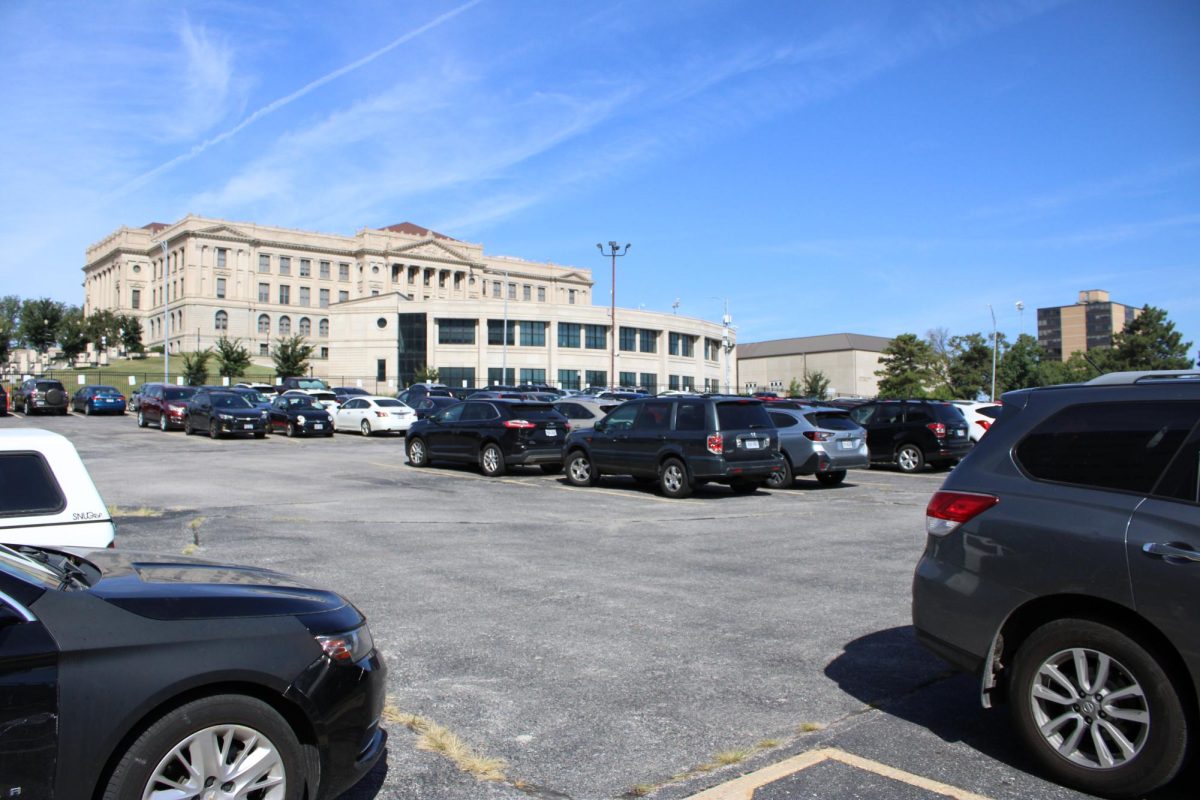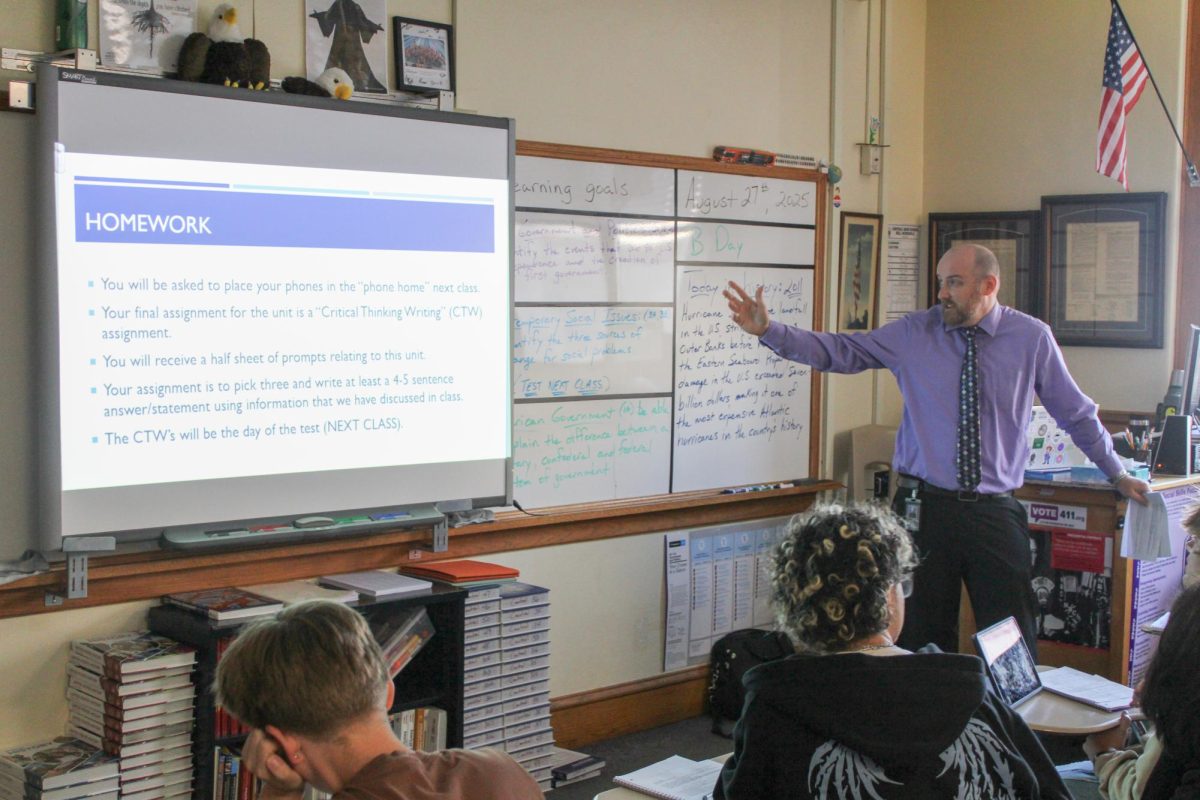President-elect Donald Trump has promised to begin mass deportation of immigrants without permanent legal status on the first day of his term, a policy that would significantly impact students at Central.
Central students without permanent legal status or who have a family member without permanent legal status who were interviewed feel “very worried,” “scared,” “disappointed” or anticipatory of what will happen. Most feel their community or family will be “definitely affected,” and many spoke to the uncertainty of when and whether their families would be deported. Interviewed students were granted anonymity to discuss the sensitivity of the impact deportation would have on their lives.
Hundreds of students at Central potentially could be impacted by the deportations, whether from being deported themselves, being separated from family members who get deported, or not being able to reunite with family migrating from another country.
Omaha Public Schools does not collect data on students’ immigration status. In the 2023-2024 school year, 13.7% of Central’s students had been born in a country other than the U.S., and 6.1% of the student population was designated as refugees, who are students from 19 countries the U.S. typically resettles refugees from. Mexico and Guatemala, the second- and third-highest birth countries for Central students, are not included in the refugee category, and 3.7% of Central students are or have been designated migrants if their family moved to the U.S. to work in agriculture.
An estimated 13.3 million individuals are in the U.S. without permanent legal status. That 13.3 million includes undocumented migrants, refugees, asylum seekers and individuals with temporary protected status (TPS).
The execution of Trump’s mass deportation plan will depend on resources and overcoming legal challenges, but Trump has said he will declare a national emergency to use the National Guard and ramp up the U.S. Immigration and Customs Enforcement (ICE) for deportations. The timeline and legal process of this plan is not firmly established, but the president has control of most affairs related to immigration.
Immigration experts also expect Trump to implement another ban on migration from some majority-Muslim countries and reduce the nationalities eligible for TPS. While Trump has said he will deport undocumented immigrants, migrants with only temporary legal status may also be at risk.
“[Trump’s] just thinking about himself…such a racist person,” one student said. “I get that he wants to protect his community, but he is not giving opportunity to other new people.”
Students who are worried said they will not have as many opportunities if they are forced to return to the country they migrated from.
“I feel sad because here I have more opportunities for school or to do something more for myself, and my family has more opportunities here,” one student said. “If I go back to Mexico, it will be stress[ful] for me, because I don’t have [anything] in Mexico.”
Access to education, economic opportunities, the ability to provide for family in other countries and “having everything I need” were opportunities students said they did not have in the country they migrated from.
“There are students who are 20 [years old] here just trying to get their GED and just get a better life, and it’s that worry of, will I even be able to come to school?” Latino Leaders President Emma Miranda said.
Refugee and asylum-seeking students migrate to the U.S. to escape credible fear of persecution in their previous country based on a protected characteristic such as race, religion, nationality, political opinion or membership in a certain social group.
“People are fleeing very horrific situations in their home countries,” said Center for Immigrant and Refugee Advancement (CIRA) Executive Director Erik Omar. “People don’t just leave their home for no reason.”
“Maybe I will not have a future [if I get deported],” an Afghan student said. “[Same for] my family too.” (Refugees from Afghanistan can receive temporary protected status.)
Family separation is another concern most students have. The American Immigration Council estimates 5.1 million children who are U.S. citizens live with a family member without permanent legal immigration status.
“I’m thinking of my future, even though I’m a U.S. citizen,” said one student. “It’s kind of complicated thinking, I’m going to college next year, but what if my mom is not here?”
A Muslim student said her family was expecting to reunite with her aunt, uncle and grandmother, but that a ban on migration from majority-Muslim countries would stop that.
Some students said their family members and friends have been preparing to leave voluntarily or be deported. Some families are working more to save money, getting family members’ immigration paperwork completed as soon as possible, or, in one family’s case, buying a house in Mexico.
While most interviewed students reported some concern about the policy and anticipated deportation, one student said they felt “in-between” about the policy and believed it will only impact “criminals” or immigrants who “damage” communities by not paying taxes. The student mentioned Venezuelan gangs in New York City as an example of who they believe the mass deportations are targeting.
There has been some confusion on who the deportations would target, because Trump refers to undocumented migrants as criminals, regardless of if they have committed crimes in the U.S. Some Republican elected officials say the deportations will not target migrants without a criminal history.
“You may not be a bad person, you may not have done anything wrong,” Miranda said. “You may not have done it on purpose, or the timing is just weird; you’re still considered a criminal in the eyes of the United States.”
Trump has floated the idea of beginning his mass deportation policy by deporting undocumented immigrants with a criminal history, although he has said he will not stop there.
“He was talking about [how] maybe the persons in jail should go [back]…to whatever country they’re from…because they haven’t done [anything] good for the state,” another student said. “But saying that [about] people [who] have been progressing this state and giving them as much as they could, they should at least get something.”
Miranda said there can be a hierarchy among Latinos based on immigration status and association with white culture.
“That’s one of the main things that drove them to vote for Trump; it’s because they don’t want to have that taint of, ‘Oh, I’m not a criminal. I’m not the one being deported. I should be fine,’” Miranda said. “Even if we don’t all have the same point of views or political standpoints, it’s still important to be connected to each other.”
While some migrants without permanent status do not pay state or federal taxes, many do. In 2022, the American Immigration Council reported that households with undocumented members status paid $46.8 billion in federal taxes, $29.3 billion in state and local taxes, $22.6 billion in Social Security and $5.7 billion to Medicare.
The American Immigration Council also estimates the mass deportation plan to cost at least $315 billion to execute all at once, or at least $967 billion if carried out over more than a decade. The U.S. gross domestic product is expected to lose $1.1 to $1.7 trillion (in 2022 dollars) from the losses in labor, tax revenue, spending and economic activity that immigrants provide.
Omar of CIRA expects “lots of legal challenges” to Trump’s plans, in addition to the “significant amount of resources” that would have to be allocated for mass deportations.
“There will be some limitations to what he can do,” Omar said. “But, I also fully anticipate him trying to do everything that’s within his powers to detain and deport people in this country.”
Trump has referenced plans to try to use the Alien Enemies Act of 1798, the Insurrection Act, an end to birthright citizenship for children of undocumented immigrants and expanded expedited removal. While Trump could invoke the Insurrection Act without congressional approval, the other plans would pose legal hurdles. As migrants are deported, they must be given a hearing, which poses legal, time and resource barriers to Trump’s plan.
Other countries’ cooperation may also pose a threat to mass deportation plans. Mexico’s cooperation with the U.S. is up in the air as Trump threatens tariffs. Venezuela, India, China and Mauritania limit or ban flights returning migrants from the U.S. to those countries.
“It’s going to affect not just our community, it’s going to affect the whole country,” a student said.
CIRA and Latino Leaders encourage students who would be impacted to know their rights. CIRA offers resources on finding sanctuaries, understanding legal rights and interacting with ICE. Miranda stressed the importance of consuming many perspectives in the media to “build your own testimony.”
“There are still things we can do within our own environment to change and impact how our lives will continue,” Miranda said.
For students who will not be directly affected, Miranda says to check in with those who will be.
“See it from their perspective…Even the person who sits next to [you] may be thinking, am I even going to be here by the end of the year?” Miranda said.
















Kaethe McCoskery • Dec 11, 2024 at 9:17 pm
So concise and I learned so much.